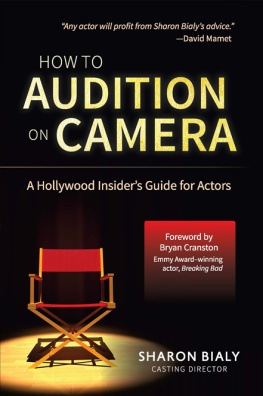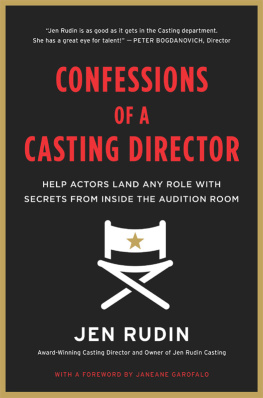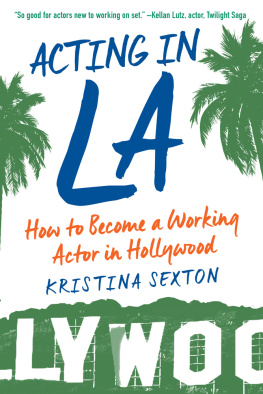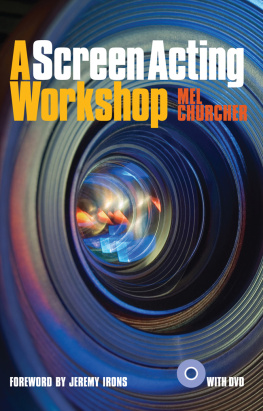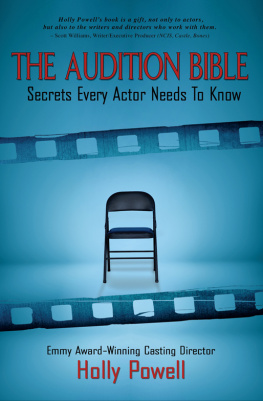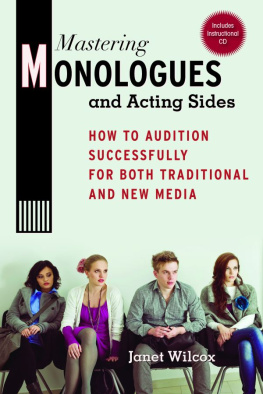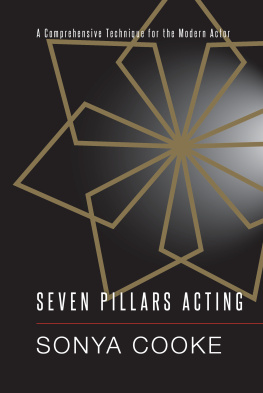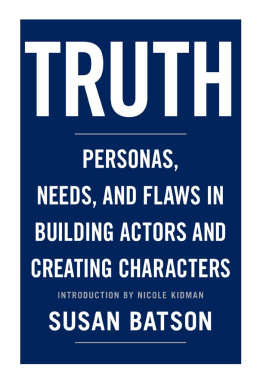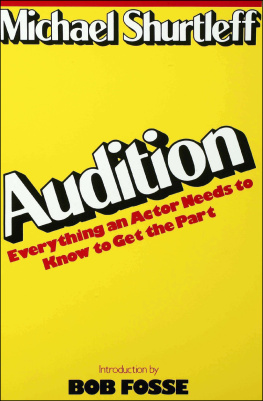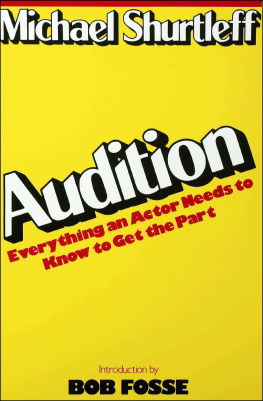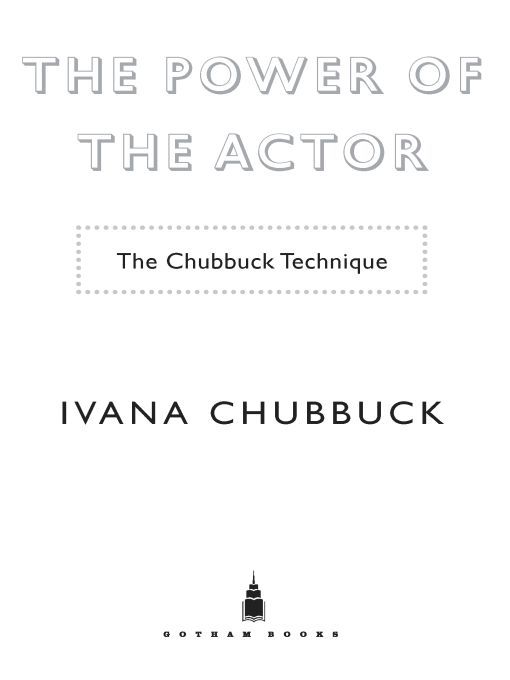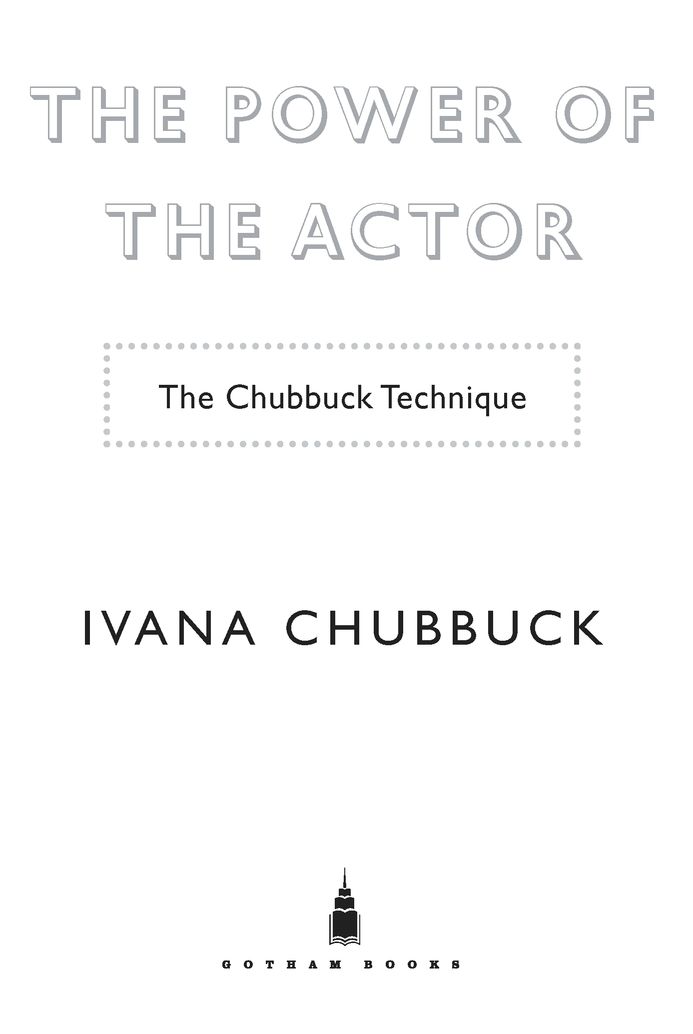Table of Contents
Ivana Chubbuck is one of the most sought after acting coaches and teachers, having taught thousands of students for over twenty years. She founded the Ivana Chubbuck Studios in Hollywood, which has become a favored place of study for actors, writers, and directors. She has been widely profiled in the media as one of the foremost authorities on acting. She lives in Los Angeles with her husband, film director Lyndon Chubbuck.
Introduction
Acting is a complex and elusive art to define. Yet almost everyone can tell good acting from bad actingor good acting from brilliant acting. Why can one actor be riveting in a play and another actor be dull and boring in the very same play, doing the same character, the same lines? If it were just the script, the beauty of its language, the artful turn of a phrase, we would only need readings. But the words are not just read with sterility from the page. They are performed and brought to life by actors.
Every actor knows that discovering and understanding your personal pain is an inherent part of the acting process. This has been true since Stanislavski. The difference between the Chubbuck Technique and those developed in the past is that I teach actors how to use their emotions not as an end result, but as a way to empower a goal. My technique teaches actors how to win.
If you look closely at virtually all drama and comedyin fact, all literatureyou will find that the will to win is the one constant element. In every story, a character wants or needs something (their goal)love, power, validation, honorand the story documents the way in which they try to win that particular desire or need. While what and how the characters try to win is defined in many ways and takes many forms and shapes, when you distill these goals down, you find that every characters conflict and struggle is about fighting to win whatever their goal is.
I teach actors how to win because this is what people do in real life! They go after what they want. Interesting and dynamic people go after what they want in interesting and dynamic ways, creating greater emotion and intensity in realizing these goals. They do this subconsciously, whereas the actor must understand himself thoroughly and have the tools to break down a script in order to make this interesting and dynamic behavior appear and feel like a subconscious process. The Chubbuck Technique stimulates this behavior, allowing for this natural and powerful human drive to be realized.
The Chubbuck Technique grew out of my search to understand and overcome my own personal traumasparticularly, how they impacted my acting and my life. I had no idea how powerful and profound this concept would become.
I grew up with a distant/dysfunctional/workaholic father and a physically and emotionally abusive mother. I developed deep-seated abandonment issues and felt unworthy of being loved. In essence, I rose to the occasion of being diminished. As an adult and an actress, I took all my childhood and adolescent horrors and wallowed in them. I was looking for sympathy and understanding, which I thought would help relieve the suffering of my past. As any actor would strive to be, I was truly in touch with my emotional pain.
But I began to wonder, To what end am I feeling all of this? How do the feelings and emotions from my past shape my work as an actor? How do they shape who I am as a person? How can these fractured, scattered and sometimes divergent emotions be focused to serve a character in a script?
As a working actress, I would see so many actors who were truly dredging up deep, painful emotions, but whose work seemed self-indulgent. I realized that having deep and profound feelings didnt necessarily make me a deep and profound person. I saw that coddling ones painin life and onstagecreates almost the opposite effect. It seems self-involved, self-pitying and weak, the key characteristics of a victim. Not the most compelling choice for an actor to make.
I began investigating how to put the legacy of emotions I had inherited to better, more effective use in my work. When I examined the lives of successful people, I noticed that they seemed to use their physical and emotional traumas as a stimulus, not to self-indulgently suffer, but to inspire and drive their great achievements.
I suspected that very same formula could be applied to actors and their approach to their work. I watched the great actors of our time and I saw in their performances the same emotional drive to overcome adversity, and, in fact, to use those very obstacles to necessitate achievement of a goal and win. In their performances, great actors were instinctively mirroring the behavior and nature of great people.
I needed to create a system that would reflect and guide this process. A system to replicate real, dynamic human behavior. A system that, once the actor committed to making fearless choices, would guide and empower the actor to use their own pain to win their characters goal. A system that would also provide a way to craft risky choices that would allow an actor to break the rules and make new rules, inspiring exceptional work and characters. A system that would create an emotionally heroic character rather than a victim.
I realized that an actor must identify their characters primal need, goal or OBJECTIVE. With this OBJECTIVE in mind, the actor must then find the appropriate personal pain that can effectively drive this OBJECTIVE. After working with this idea for a while, I understood that the pain must be powerful enough to inspire an actor to fearlessly commit to doing whatever it takes to WIN their OBJECTIVE. If the emotions were not strong enough, then there wasnt enough there to help the actor sustain their fight to win. But when the appropriate personal pain is paired with an OBJECTIVE, it connects the actor to their characters predicament, making winning the OBJECTIVE real and necessary for them as a person, not just as an actor playing a part. With this new approach, my cutting-edge technique was born.
I began working to refine this theory of overcoming personal pain to empower a performance into a technique. I had to figure out how to help actors find a way to psychologically personalize and feel their characters drive to win as their own.
Once I began applying these concepts I found the process so personally enriching that it literally took over my life. I began teaching seven days a week, many hours a day. Because I primarily taught and coached working actors, word spread through the professional acting community quickly. I opened an acting studio. Shortly thereafter, the studio had a rather lengthy waiting list. I never advertised and refused to do any promotion or have my school listed in any of the trade publications for actors. I didnt even have a website. In fact, for a number of years, my studios telephone number was unlisted. I wasnt being snobby or arrogant, I just figured that if an actor really wanted to find me, they would. Some people went to great lengths to get into my class, sometimes taking months just to get the schools phone number. As a result, I attracted those who were truly dedicated to the craftwhether they were a writer, director or actor. I truly believe that the quality of my students, the majority of whom are committed, working actors, has been a part of elevating and advancing my technique.


